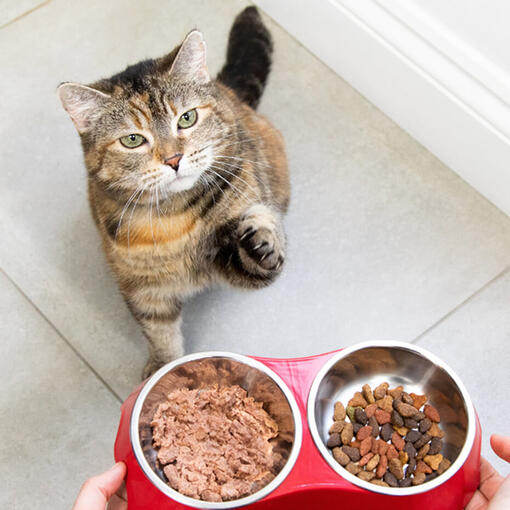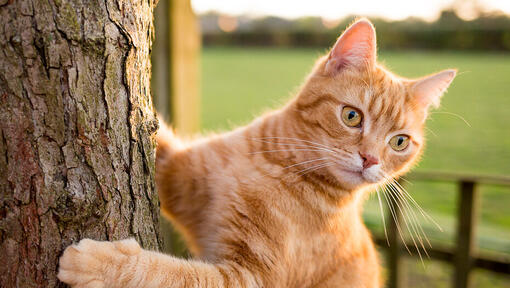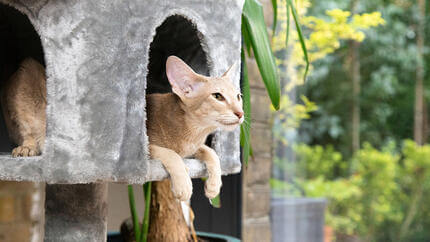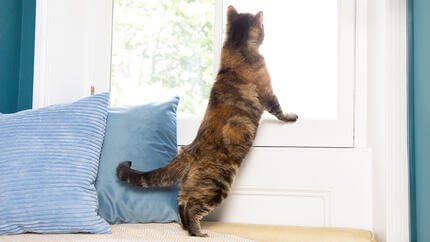

Trying to decide whether your new cat or kitten is going to live outdoors or not is a difficult choice. If you’re on the fence and not sure which is best, read this guide to find out all you need to know.
In many countries, allowing cats outside is actually rather common.
If you live in a quiet, rural location, it could be a great idea to let your kitty roam free, but of course there are situations where your cat would be safer inside, such as if you live in a busy city. If you’re on the fence about whether to let your new cat explore the wider world, keep reading to discover the potential benefits and risks for outdoor cats.
How do cats choose if they want to be outdoor or indoor?
All cats have their own personal preferences and personalities, so sometimes they may just make the indoor/outdoor choice for you. Generally, it’s quite easy to tell as more timid or older cats will likely prefer the comfort of the indoors, so they’ll be less keen to bolt out the door every time it’s open.
Whereas, if your cat is bursting with excitement, clawing at any slightly open door or window, it’s probably because they want to be an outdoor cat. As an owner, it’s important that once you’ve made the choice, you stay consistent throughout the rest of their lives, as they may find it difficult to adjust as they get older.
5 Benefits of outdoor cats
There are so many benefits to letting your cat explore the wider world, a few of the most key ones are as follows:
An outdoor cat is far less likely to become overweight, which is due to the fact that the great outdoors just has so much to do! When out and about, cats are more likely to spend their time climbing, running and exploring which is all excellent for their physical health.
The great outdoors is also proven to be better for your feline’s mental health. This is largely due to the vast variety of smells, sights and sounds to stimulate their senses. Additionally, it helps to provide an escape from any potential stresses in your home.
One of the key benefits to letting a cat outside is that it provides an outlet for their natural behaviours. They’ll get to scratch on trees (potentially saving your sofa), patrol their territory and put their hunting instincts to use, which is especially great if you’re looking to control the rodent population in rural areas.
This one can often be a deciding factor for owners that don’t want to spend all their time cleaning out a litter tray. Many outdoor cats will simply do their business outside. However, there are some cats that will prefer the comfort of a litter tray so will come inside to go to the toilet anyway, and others may protest to going outside when it rains. It’s a good idea to keep a litter tray in your home just in case.
If you find yourself spending a lot of time away from home due to work commitments, then an outdoor life may be best for your cat. Typically, indoor cats require much more entertainment and attention from their owners compared to outdoor cats who have plenty of stimulation outside.
Potential risks for an outdoor cat
As always, when there are benefits, there are also risks. A few of the risks for outdoor cats you should be aware of are:
- Injuries from cars – this particular risk is increased for kittens under the age of one, but once they get past this age, they’re more likely to be aware of the dangers.
- Sleeping on top of tyres or under car bonnets – this is quite common with cats during the colder months, especially if the car’s recently been on and is still warm.
- They may get lost – if your cat’s not particularly aware of their area they may end up going too far and getting lost.
- More likely to encounter toxic substances – people often use chemicals in their gardens such as slug pellets, anti-freeze, rodent poisons or have toxic plants.
- Increased risk of fighting – this is more of a problem in built up areas as each cat’s territory overlaps with another.
- Increased risk of coming into contact of disease, ticks, fleas or worms – largely due to increased exposure to other cats and the outdoor environment.
Keeping your outdoor cat safe
As a pet owner, it’s only natural that you want to ensure that they’re kept as safe as possible when outdoors enjoying all the sights and smells. Luckily, there are a few things you can do to make sure they’re living their best possible life and staying safe.
Keep up-to-date with vaccinations, flea and worming treatment
Because of the fact they’re more likely to come into contact with other cats, keeping their vaccinations up-to-date is more important than ever. Additionally, you should also ensure that you’re regularly administering flea and worming treatment to ensure that they’re kept happy and healthy.
Install a cat flap
If there’s no one home during the day to let your cat back in if they feel threatened by something outside, installing a cat flap is essential. If you’re concerned that other cats in your neighbourhood will use it, you can get ones that are programmed to only respond and open for your cat’s microchip or collar.
Get your cat microchipped
For outdoor cats, it’s vital to get them microchipped. If your kitty ever wanders too far from your home or happens to get stuck in someone’s garage or shed, a microchip will greatly increase your chances of being reunited with your cat. Then anyone who finds your cat just needs to take them to the vet where they can scan the chip to get your contact details.
Safety collar and tag
As well as your cat’s microchip, you should also get them a safety collar and tag for outdoor cats. Always ensure that you get them a break-free collar so that if they ever get stuck on something – which can happen when they’re climbing and exploring – it’ll simply undo and let your cat free. Reflective collars are good too as these will increase their visibility if they’re ever outside at night. If you have a tag with your contact details it may also help you to be reunited with your kitty much sooner.
Get your cat neutered
It’s generally a good idea to get your cat neutered if they’re going to be outside. If they’re un-neutered it increases the risk of unwanted pregnancy and they’re more likely to travel further from home as they’ll be searching for a potential mate. Additionally, unneutered males are known to be much more territorial and have issues with marking and spraying, as well as getting into fights with other cats.
Grow cat-friendly plants
If you have cat-friendly plants in your garden for them to enjoy, it’s much less likely that they’ll try to eat toxic or poisonous ones. Grow plants such as catnip, catmint, lavender and cat grass and always ensure that the products you use on any of your plants are non-toxic and organic.
Want to find out how your new cat or kitten interprets their surroundings? Read our article on how your cat experiences the world.














